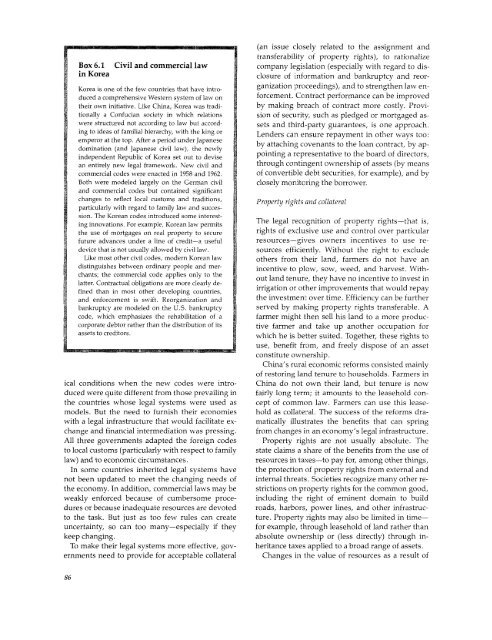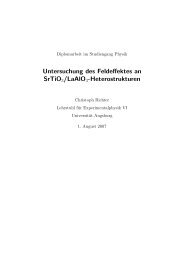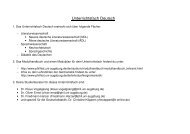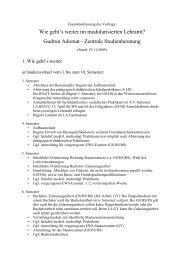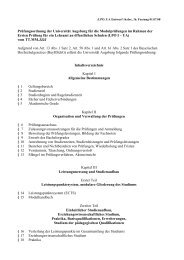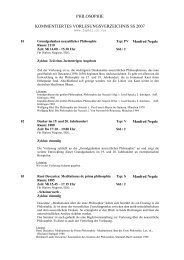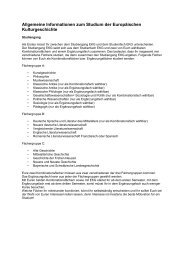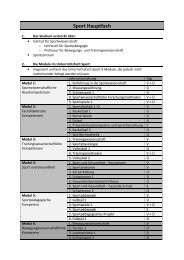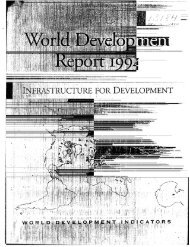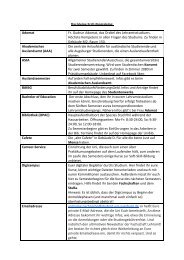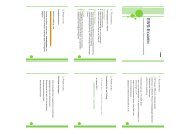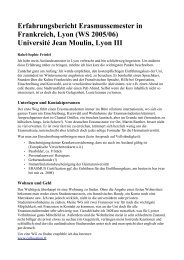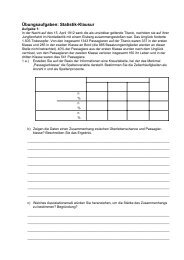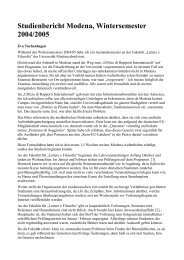Financial systems and development
Financial systems and development
Financial systems and development
You also want an ePaper? Increase the reach of your titles
YUMPU automatically turns print PDFs into web optimized ePapers that Google loves.
(an issue closely related to the assignment <strong>and</strong><br />
transferability of property rights), to rationalize<br />
Box 6.1 Civil <strong>and</strong> commercial law company legislation (especially with regard to disin<br />
Korea<br />
closure of information <strong>and</strong> bankruptcy <strong>and</strong> reor-<br />
Korea is one of the few countries that have intro- ganization proceedings), <strong>and</strong> to strengthen law enduced<br />
a comprehensive Western system of law on forcement. Contract performance can be improved<br />
their own initiative. Like China, Korea was tradi- by making breach of contract more costly. Provitionally<br />
a Confucian society in which relations sion of security, such as pledged or mortgaged aswere<br />
structured not according to law but accord- sets <strong>and</strong> third-party guarantees, is one approach.<br />
ing to ideas of familial hierarchy, with the king or Lenders can ensure repayment in other wavs too:<br />
emperor at the top. After a period under Japanese b<br />
. . ~~~~~~~~~~bv attachin,, covenants to the loan contract, by apdomination<br />
(<strong>and</strong> Japanese civil law), the newly .<br />
independent Republic of Korea set out to devise pointing a representative to the board of directors,<br />
an entirely new legal framework. New civil <strong>and</strong> through contingent ownership of assets (by means<br />
commercial codes were enacted in 1958 <strong>and</strong> 1962. of convertible debt securities, for example), <strong>and</strong> by<br />
Both were modeled largely on the German civil closely monitoring the borrower.<br />
<strong>and</strong> commercial codes but contained significant<br />
changes to reflect local customs <strong>and</strong> traditions, Property rights <strong>and</strong> collateral<br />
particularly with regard to family law <strong>and</strong> succession.<br />
The Korean codes introduced some interest- T<br />
ing innovations. For example, Korean law permits The legal recognition of property rights-that is,<br />
the use of mortgages on real property to secure rights of exclusive use <strong>and</strong> control over particular<br />
future advances under a line of credit-a useful resources-gives owners incentives to use redevice<br />
that is not usually allowed by civil law. sources efficiently. Without the right to exclude<br />
Like most other civil codes, modern Korean law others from their l<strong>and</strong>, farmers do not have an<br />
distinguishes between ordinary people <strong>and</strong> mer- incentive to plow, sow, weed, <strong>and</strong> harvest. Withchants;<br />
the commercial code applies onlv to the, ,<br />
chants; tecm riloeout l<strong>and</strong> tenure, thev have no incentive to invest in<br />
latter. Contractual obligations are more clearlv defined<br />
than in most other developing countries, irrigation or other improvements that would repay<br />
<strong>and</strong> enforcement is swift. Reorganization <strong>and</strong> the investment over time. Efficiency can be further<br />
bankruptcy are modeled on the U.S. bankruptcy served by making property rights transferable. A<br />
code, which emphasizes the rehabilitation of a farmer might then sell his l<strong>and</strong> to a more produccorporate<br />
debtor rather than the distribution of its tive farmer <strong>and</strong> take up another occupation for<br />
assets to creditors.<br />
which he is better suited. Together, these rights to<br />
use, benefit from, <strong>and</strong> freelv dispose of an asset<br />
constitute ownership.<br />
China's rural economic reforms consisted mainly<br />
of restoring l<strong>and</strong> tenure to households. Farmers in<br />
ical conditions when the new codes were intro- China do not own their l<strong>and</strong>, but tenure is now<br />
duced were quite different from those prevailing in fairly long term; it amounts to the leasehold conthe<br />
countries whose legal <strong>systems</strong> were used as cept of common law. Farmers can use this leasemodels.<br />
But the need to furnish their economies hold as collateral. The success of the reforms drawith<br />
a legal infrastructure that would facilitate ex- matically illustrates the benefits that can spring<br />
change <strong>and</strong> financial intermediation was pressing. from changes in an economy's legal infrastructure.<br />
All three governments adapted the foreign codes Property rights are not usually absolute. The<br />
to local customs (particularly with respect to family state claims a share of the benefits from the use of<br />
law) <strong>and</strong> to economic circumstances.<br />
resources in taxes-to pay for, among other things,<br />
In some countries inherited legal <strong>systems</strong> have the protection of property rights from external <strong>and</strong><br />
not been updated to meet the changing needs of internal threats. Societies recognize many other rethe<br />
economy. In addition, commercial laws may be strictions on property rights for the common good,<br />
weakly enforced because of cumbersome proce- including the right of eminent domain to build<br />
dures or because inadequate resources are devoted roads, harbors, power lines, <strong>and</strong> other infrastructo<br />
the task. But just as too few rules can create ture. Property rights may also be limited in timeuncertainty,<br />
so can too many-especially if they for example, through leasehold of l<strong>and</strong> rather than<br />
keep changing.<br />
absolute ownership or (less directly) through in-<br />
To make their legal <strong>systems</strong> more effective, gov- heritance taxes applied to a broad range of assets.<br />
ernments need to provide for acceptable collateral Changes in the value of resources as a result of<br />
S6


